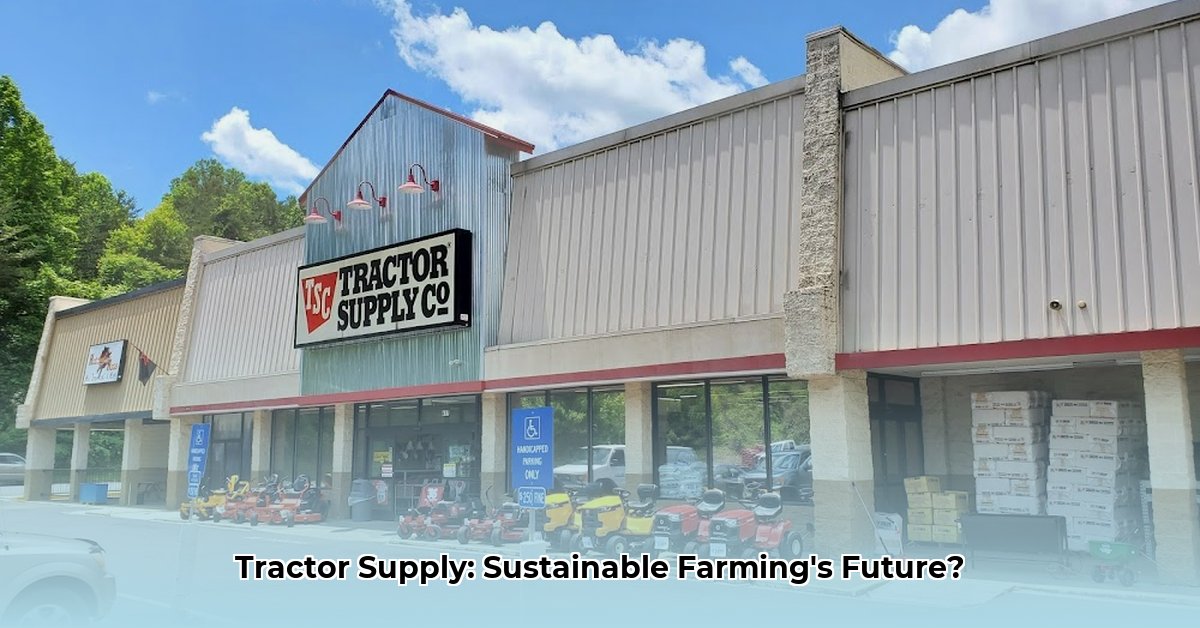
Morganton Tractor Supply: Convenient Access, Uncertain Sustainability
Morganton Tractor Supply Company (TSC) in Morganton, North Carolina, provides convenient access to agricultural supplies for local farmers. Its extended hours – 8 am to 9 pm – enhance operational efficiency. However, the extent to which this convenience contributes to sustainable farming practices remains unclear. This analysis investigates TSC's role in promoting sustainable agriculture within the local community, focusing on access to supplies, sustainability of inputs, environmental impact of transportation, community engagement, and outlining actionable recommendations for future research. Sustainable agriculture, in this context, refers to farming practices that minimize environmental impact, promote biodiversity, and ensure long-term economic viability. For more information on starter fertilizers, see this resource.
The Sustainability of Inputs: Significant Data Gaps
A critical limitation of this analysis is the lack of detailed data on the sustainability of products sold by Morganton TSC. Crucial information regarding the proportion of organic versus conventional products, the environmental impact of fertilizers and pesticides, and the sourcing of seeds is unavailable. This absence of data significantly hampers a comprehensive evaluation of the store's contribution to sustainable agriculture. Without this information, it's impossible to determine the extent to which the store promotes or hinders sustainable farming practices. A quantifiable assessment is simply not feasible.
Environmental Impact of Transportation: Unveiling Hidden Costs
The environmental impact of transportation – both farmers traveling to the store and the transportation of goods to the store – is another significant factor. Estimating the carbon footprint requires data on the average distance traveled by farmers, the type of vehicles used, and the fuel efficiency of those vehicles. This data was unavailable for this analysis. Similarly, data on the transport methods and distances for goods delivered to the store are needed to estimate the overall transportation-related greenhouse gas emissions. This illustrates a key limitation – our understanding of the environmental impact is heavily constrained by the absence of relevant quantitative data.
Community Engagement: Exploring Uncharted Territory
The potential for community engagement in promoting sustainable agricultural practices through partnerships with local organizations or educational initiatives remains largely unexplored. Without data on Morganton TSC's community outreach programs or collaborations with sustainable agriculture initiatives, we cannot assess the extent of its impact. Understanding the store's role in fostering sustainable practices necessitates a detailed investigation of its relationship with the local community.
Actionable Recommendations: A Roadmap for Future Research
To address the significant data gaps identified in this analysis, several key steps are crucial:
Comprehensive Product Audit: Conduct a thorough audit of top-selling fertilizers, pesticides, and seeds, rating them based on independently verified sustainability certifications (e.g., USDA Organic, Rainforest Alliance). This would provide a quantitative assessment of the store's offerings in terms of sustainability.
Farmer Travel Data Collection: Utilize surveys and potentially GPS tracking (with informed consent) to determine the average distance traveled by farmers to Morganton TSC. This data, combined with vehicle type and fuel efficiency information, will allow for a robust calculation of transportation-related carbon emissions.
Community Engagement Assessment: Conduct interviews with local farmers and representatives from relevant agricultural organizations to evaluate the store's involvement in educational programs or partnerships promoting sustainable practices. Detailed qualitative data will uncover the extent and impact of their engagement.
Supply Chain Transparency: Encourage Morganton TSC to disclose detailed information about its supply chain, including data on the origin, processing, and transport of goods. Greater supply chain transparency will improve the accuracy of any future environmental impact assessments.
Collaboration: Foster collaborative partnerships between Morganton TSC, local farmers, researchers, and relevant government agencies to improve data collection and encourage transparency across all aspects of the supply chain.
Conclusion: A Call for Collaboration and Further Research
This analysis highlights the challenges in assessing the impact of a local agricultural retailer, like Morganton TSC, on sustainable farming practices. Due to significant data limitations, a comprehensive evaluation remains elusive. The findings stress the urgent need for further research, collaborative efforts between stakeholders, and increased transparency within the agricultural retail sector. Only through these efforts can we gain a complete understanding of the complex relationship between agricultural retailers and the sustainability of farming practices. This underscores the need for transparency and open data sharing to enable more robust and informed decision-making for a more sustainable future.